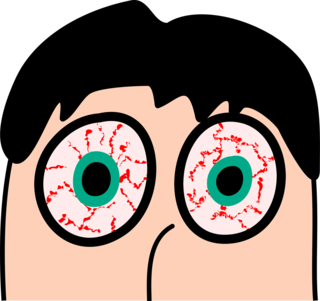Sleep
6 Ways That Night-time Phone Use Destroys Your Sleep
Using your phone at night will make you sleep-deprived and exhausted. Really.
Posted April 17, 2018 Reviewed by Kaja Perina

I’ve written a lot about sleep, but it’s time I wrote an article that’s just about the phone problem.
I see many people in my medical work who are looking for sleeping pills because they can’t get a good night’s rest. Coaching clients, too, complain of trouble winding down, poor sleep and broken sleep.
The first thing I target?
The phone.
People have a vague idea that using their phone before bed (or in bed) affects their sleep, but that vague awareness usually isn’t enough to seriously change their habit.
You need to change your habit, seriously.
Here, based on findings from a study by Harvard researchers, are 6 reasons why you need to stop using your phone (and any other screens) in the hour or two before bed:
1) It will take you longer to fall asleep
Study participants who were using an E-reader before bed (a blue light-emitting screen similar to a tablet or smartphone) took on average of 10 minutes longer to fall asleep versus those who were reading a normal print book. Try reading a real book at night instead of doing anything on your phone or watching TV or Netflix, and you’ll see how much sleepier you feel and how much more quickly you fall asleep.
2) It will mess with and delay your circadian clock rhythm
It seems almost every week we get more data which illustrates the paramount importance of a healthy, well-synched circadian rhythm. So many (almost all?) of your body functions hinge on this. Your metabolism, your mood, your appetite for sweet or junky foods (and in turn your weight), your risk of developing diabetes and possibly even cancer, the list goes on and on. Artificial light at night, especially the blue type from phones and screens, confuses your brain and messes up this clock.
3) It will suppress your melatonin secretion when you need it most
The hormone melatonin plays a key role in maintaining a proper circadian rhythm and promoting deep, restorative sleep. It may also play a role in protecting the health of your brain as you age. Even low levels of light, such as a dim bedside lamp, can decrease the production of melatonin (for this reason, you should never sleep with a “nightlight” on and use good blackout curtains). The light emitted from phone screens, shining directly in your eyes, suppresses the production of this crucial hormone in the evening. If you must look at a screen, turn it way down and use any program available (such as “night shift” on an iPhone) that will decrease the component of blue light.
4) It will decrease your REM sleep
REM sleep is a stage of sleep that is critical for restoration of your mind and body. REM sleep solidifies memories and is tied to your creative and problem-solving skills. If you don’t get enough of it, it can leave you feeling groggy and having difficulty concentrating the next day.
5) It will make you more alert when you want to wind down
Lying in bed, reading your phone is relaxing, right? Dead wrong. The research shows that it actually wakes you up, making you feel more alert, less sleepy, and more likely to delay even trying to go to sleep. You know that delicious feeling you get when you’re reading a book in bed, and your eyes start to droop, and then you reach over and turn out the light to got to sleep? Looking at a screen at night will cause the reverse. You’ll get more awake, stay up later, and kick yourself for doing it the next morning when you wake up exhausted.
6) You will feel more tired and less alert when you wake up
According to the Harvard study, reading a screen before sleeping will cause you to feel more sleepy and groggy when you wake up in the morning. Those who read from a screen before bed reported taking hours longer to fully “wake up” the next day, compared to those who read a printed book instead.
I hope this is hitting home for you. Looking at screens at night, especially shortly before bed, will make it harder for you to go to sleep. You’ll be less likely to feel like going to bed, even though your body may desperately need the sleep. Your circadian clock will get messed up and affect your health in a multitude of negative ways. You’ll sleep less deeply, wake less refreshed and it may take hours for you to properly wake up the next day (well into your workday, whoops).
I know how hard it is to break this habit. I typically have to coach my clients on phone-avoidance strategies and hold them accountable to their commitments. You have to find other bed-time routines that don't involve screens, that you find enjoyable and relaxing.
For myself, I’ve found that setting an alarm on my phone is really helpful. I usually go to bed between 10:30 and 11 pm, so I’ve set a reminder to go off at 9 pm, telling me to put the phone down and reminding me that I need to stop all screens at that point, for the rest of the evening. No phone, no computer, no tablet, and no TV. Just real books, listening to music, hanging out with my husband, whatever doesn't involve a screen. There are actually lots of wonderful options!
I implemented this recently as I’d been falling back into the nighttime phone habit, and my sleep had really suffered as a result. Ever since I got back into the strict no-screens after 9 pm regime, I have truly been sleeping like a baby. I hardly wake up throughout the night, sleep a solid 8 hours, and wake up feeling refreshed and ready to go. The difference is dramatic.
I urge you to try this new habit out, for at least a week. I’m trusting that the impact on your life will be so positive, that you won’t ever want to go back to scrolling through Facebook in bed, ever again. (And, of course, if this doesn't do the trick and you continue to experience serious sleep challenges, please go see your doctor to rule out other causes of poor quality sleep)
- Copyright Dr. Susan Biali Haas 2018




